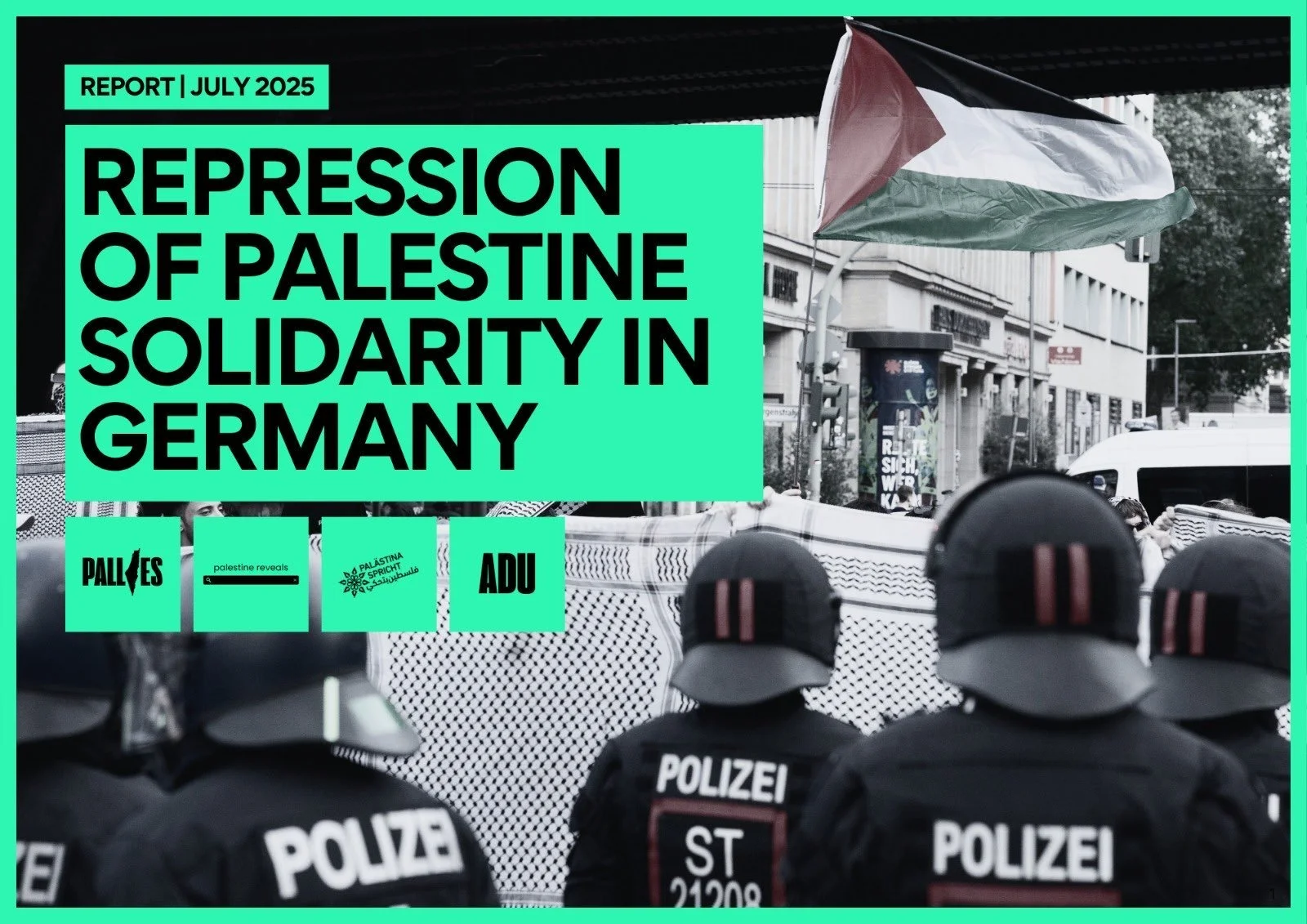Report: REPRESSION OF PALESTINE SOLIDARITY IN GERMANY
Summary of Report
by PAllies, Palestine Reveals, Palestine Speaks, ADU
The German State is actively enabling and supporting the genocide in Gaza (Law for Palestine, 2024b) even after the International Court of Justice issued an interim ruling alerting all states to a potential genocide case (International Court of Justice, 2024a). It's in this light that Palestinians and the Palestine solidarity movement in Germany are facing an escalating campaign of political repression that spans law enforcement abuses, legal sanctions, and censorship (ELSC, 2025). This report documents how German authorities systematically curtail freedoms of assembly, expression, academia, and art when it comes to anti-genocide protests and advocacy for Palestinian rights. The report details the different forms of repression: from legal repression, criminalisation, and surveillance to delegitimizing dissent within the educational sector, arts, and media. Such measures erode Germany’s democratic fabric and form a pattern of political persecution that undermines Germany’s democratic principles and international human rights obligations (Monroy, 2025; ELSC, 2025a). European legal expert Alice Garcia of the European Legal Support Centre (ELSC) cautioned that current practices in Germany are “unequivocally comparable to practices of authoritarian regimes” (Jamal, 2023a). Indeed, international watchdog CIVICUS downgraded Germany’s civic space rating from “open” to “narrowed” due to these curbs on fundamental freedoms (Serhan, 2024). Additionally, the Civic Space Report 2025 by the European Civic Forum identifies Germany as one of the most repressive EU states in relation to Palestine advocacy, highlighting the systematic misuse of public order laws and excessive use of executive and police power (European Civic Forum, 2025, p. 20).
The sum effect is a chilling atmosphere in which legitimate dissent with the German State´ s complicity in the genocide is being suppressed and persecuted under the guise of combating antisemitism and terrorism.
Widespread, systematic repression: Since 2019, at least 766 incidents of State repression against Palestine solidarity have been documented in Germany (Monroy, 2025; ELSC, 2025a). Examining the repression reveals it as widespread, systematic, and deliberate.
Fields of repression: This repression extends across all areas of civic life in Germany, encompassing protests, universities, schools, art and cultural institutions, media, and online spheres.
Legal and administrative crackdown: Authorities are leveraging a broad array of laws to pursue anti-genocide activists, including criminal and civil law. Migration law has been weaponized against non-citizens, including often stateless Palestinians, who face deportation, visa cancellations, or asylum denials, creating a climate of fear and legal precarity for immigrant activists in Germany (ELSC, 2025a; Salfiti, 2025; Wystrychowski, 2025).
Police violence: German police frequently employ disproportionate force against Palestine-solidarity protesters, including mass arrests, physical brutality, and unlawful treatment (Arrest Press Unit, 2025).
Surveillance and securitization of solidarity: German domestic intelligence agencies have increasingly framed Palestinians and Palestine solidarity as a potential security threat. Measures such as categorizing Palestine activism as “left-wing extremism” constitute a form of securitization, in which political dissent is treated as a national security issue – a deeply troubling development for a democracy (Bundesamt für Verfassungsschutz, 2024; ELSC, 2025a).
Discursive delegitimization: Government bodies, institutions, media, and civil society increasingly target anti-Zionism and protected political speech through conflating it with antisemitism and support for terrorism, in a deliberate campaign to shut down, vilify, and render unthinkable any solidarity with Palestinians and dissent over Germany's support of Israeli politics of genocide, apartheid, and occupation, all of which contradict Germany’s agreement to UN chartas, resolutions, and international law.
Censorship within the cultural sector: Cultural institutions have become sites of systemic silencing over Palestine solidarity. Since late 2023, over 200 Palestine-related events have been canceled, censored, or disrupted across academic and cultural institutions, media platforms, political and state bodies, as well as civil society spaces (Archive of Silence, 2025).
Exclusion within the education sector: Since at least 2019, the educational sector in Germany has been an epistemological battlefield. Freedom of academia and speech is curtailed for students and educators alike, with adherence to government narratives and policies taking on more importance than scientific inquiry (El-Hitami, 2024; Wystrychowski, 2025). Scholars report self-censorship, while students – especially foreign nationals – face threats to their careers or residency status if they speak out (ELSC, 2025a). Symbols of Palestinian culture have been banned in Berlin schools. Police increasingly feature on campus, including through physically violent repressions against student protests. In October 2023, the Berlin Senate Administration issued a letter to schools in the city encouraging them to prohibit the display of Palestinian symbols, including the keffiyeh and “Free Palestine” badges (ReachOut/ARIBA, 2023).
Impact on marginalized groups: This repression disproportionately targets, stigmatizes, and criminalises Palestinian, Arab, and Muslim people and communities, as well as Jewish Germans, Jewish foreign nationals, and Israelis who are critical of Israeli state politics.
Note: The list of references is available in the full report.
